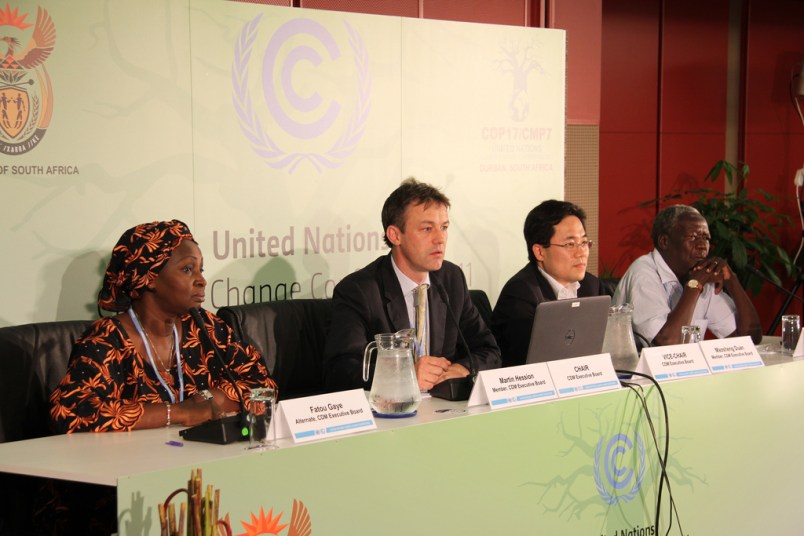EMILY GERTZ
In international climate politics, the United States has long been the superpower elephant in the room. The U.S. invariably talks a good game about urgency, responsibility, and cooperation, but seems invariably to put its own political and economic interests above the need for global action to curb global warming.
At yearly UN climate talks, other nations seem to tread lightly on U.S. intransigence for at least a few days. But this year, negotiators and enviro-advocates are already publicly criticizing the Obama administration for undercutting the talks.
In a letter dated Nov. 29, 16 major national and international environmental groups admonish Secretary of State Hillary Clinton directly, saying that “America risks being viewed not as a global leader on climate change, but as a major obstacle to progress.”
The letter notes key diplomatic crux points where U.S. demands may scuttle even the modest goals for the Durban talks.
And yet, not a single U.S. lawmaker is expected to attend the two-week long event, with only some of their aides having been sent to act in their stead, the Washington Post reported. Even Democratic lawmakers, who in principle support climate change legislation, defended their decision to say home due to scheduling conflicts.
“There is just too much left to be done in Congress before the holidays for members or staff to travel across an ocean and the equator with enough time to get back for important votes to keep the country running,” said Eben Burnham-Snyder, a spokesman for Rep. Edward J. Markey (D-MA), the Post reported.
Meanwhile, in Durban, on the third day of the U.N.’s annual summit on climate change, delegates from European and African nations also denounced the U.S. for a lack of leadership on climate change.
As Mali’s Seyni Nafo told the Associated Press: “We use and we welcome their leadership on democracy, on access to markets, on human rights issues. We would want to have the same leadership to tackle climate change, because for us in the developing world the biggest threat, the biggest enemy, is climate change.”
As Kate Joost recalled in Mother Jones on Tuesday, Bush administration delegates at 2007’s Bali talks were booed for refusing to sign on to plans–the “Bali roadmap”–to create a successor to the Kyoto climate treaty. (The U.S. ultimately reversed its position.)
In late 2008, then-President Elect Obama promised to change course, telling a conference of U.S. governors that that the U.S. was ready to join the world in fighting global warming. But in terms of the UN climate treaty, that promise hasn’t been kept.
According to the Big Green groups in their letter to Secretary of State Clinton, one problematic position the U.S. has brought to Durban demands that developing nations (currently exempt from greenhouse gas reduction targets under the Kyoto Protocol) agree to legally binding emissions cuts in any Son of Kyoto treaty, with no phase-in period of voluntary cuts.
At the same time, the U.S. is demanding that developing nations drop their own pre-condition for economic development aid, or “climate finance,” from the rich industrialized nations.
If this is really a global climate crisis, why should anyone get a break, right?
But developing nations at the talks, particularly the powerful “Group of 77” bloc led by China, counter that even the best-off among them, like China and India, are still modernizing their economies and trying to pull millions of citizens out of extreme poverty. With its demands, the U.S. is telling them to do both without using the same cheap fossil fuels that propelled nations like the U.S., England, Germany, and Japan into enormous prosperity and power–and without those nations spreading around some of the resulting wealth, as well.
Nafo, spokesperson for 54-nation Africa Group at the Durban climate talks, has announced that it would need $500-600 billion from the wealthy industrialized nations to pay for carbon emissions reductions and adaptation to climate change, according to The Times of South Africa.
The $100 billion figure that’s been central to discussions so far is a “symbolic political number,” Nafo is quoted as saying, with “nothing to do with science or a rational and objective assessment.”
The U.S. knack for avoiding tough choices for itself while demanding them of others hasn’t gone unremarked in Durban, according to OneClimate.
The grassroots media group reports that Jonathan Pershing, the lead U.S. negotiator, commented yesterday that “there was an infinite number of pathways to stay below 2 deg. C.” — meaning, to keep global surface temperatures from rising past an unsafe point.
“Campaigners have been quick to point out,” reports OneClimate’s low-key anchor, “that if there really is an infinite number of pathways to stay safe, it’s surprising that the U.S. is managing to avoid every one of them.”






